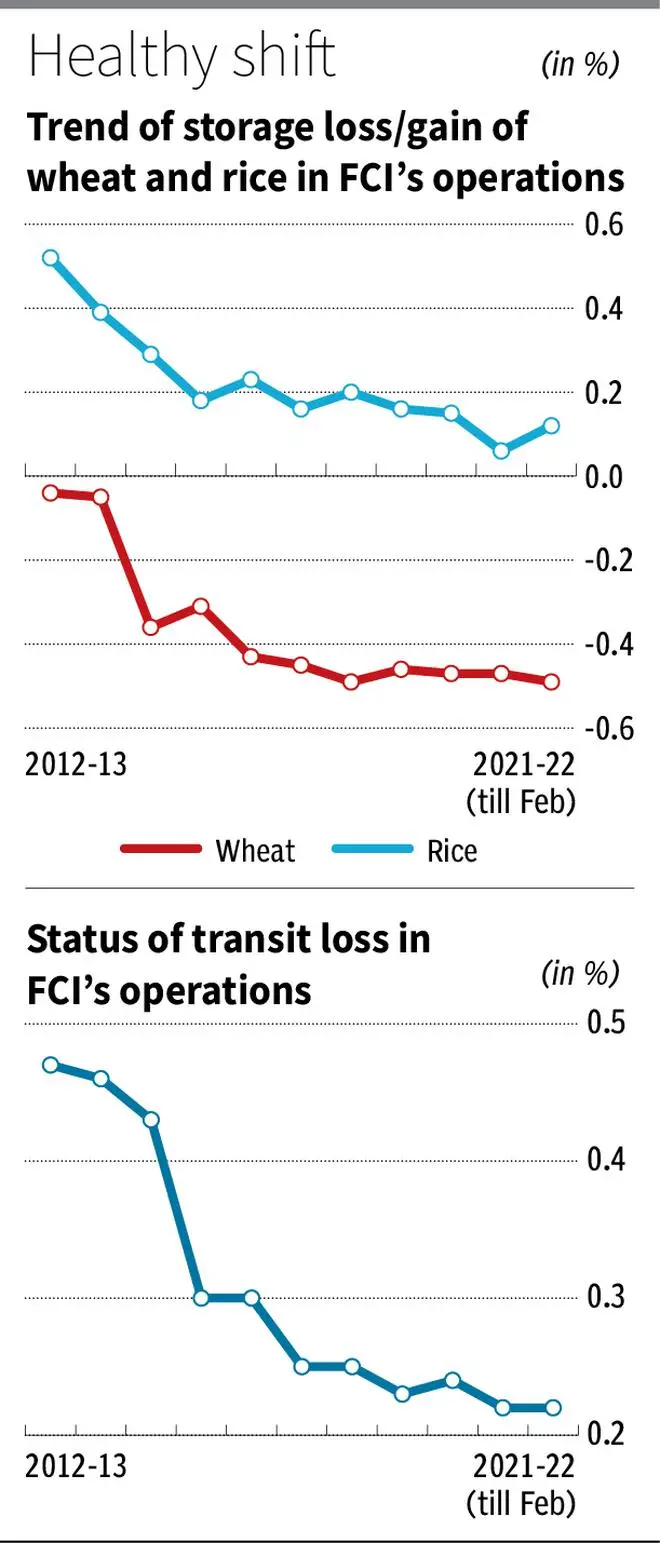Foodgrains lost in storage and transit is a major cause for concern. Apart from weakening food security, it hurts the environment through greenhouse gas emissions.
The Food and Agriculture Organisation (FAO), in a 2019 report, estimates that for every kg of food lost in the supply chain in Central and South Asian regions, about 2.2 kg CO2 equivalent is emitted, adding to the problem of global warming and climate change which are a major threat to agricultural output across the world.
In India, the Food Corporation of India (FCI) is the nodal Central agency for ensuring food security of the nation, by managing the supply chain of wheat and rice. FCI, along with allied State government agencies, procures wheat and rice (in the form of paddy) and small quantities of coarse grains at Minimum Support Prices (MSP) and directly credits the money into farmers’ accounts. The payment for the entire purchase comes from the Union Government and forms the central pool stock.
The average share of wheat and rice purchased by the FCI in the last 10 years has been about 31 per cent and 38 per cent of country’s production, respectively. And due to the expansion of procurement and the government’s commitment to farmers for open-ended purchase of wheat and rice, the share has risen to as high as 48.38 per cent for rice in 2020-21and 40.23 per cent for wheat in 2021-22. The central pool stock is distributed among 813 million beneficiaries under the National Food Security Act (NFSA) across the nation through more than 5 lakh fair price shops.
While foodgrains procured by State agencies are distributed within the State to meet their requirements, the surplus is taken over by FCI for storage and distribution in deficit States through their civil supplies agencies. In the process, FCI transports about 66 per cent of rice procured in 10 surplus States and 82 per cent of wheat procured in three surplus States.
FCI has helped save about 4.7 million tonne (mt) of food in the last decade, by gradually reducing its operational losses in the supply chain of the central pool of wheat and rice stocks. These savings come from the reduction of two main sources of operational losses — storage and transit.

The storage loss for rice, which is prone to losing moisture during long-term storage, was about 0.52 per cent in 2012-13. However, with constantly improving operational practices and effective monitoring, it has gradually come down to 0.12 per cent in 2022-23. In the case of wheat, which is hygroscopic in nature and can gain or lose moisture more easily depending on environmental condition, the overall storage gain has risen from 0.04 per cent to 0.49 per cent during the same period. Thus, FCI has helped save 17.90 lakh tonne (lt) of wheat and 18.15 lt of rice during the last 10 years.
Financially, at current value, the savings to the central exchequer amount to ₹10,300 crore and environmentally it has enabled to cut CO2 emission by 7.93 mt.
More commendable
Similarly, transit loss has also declined substantially from 0.47 per cent in 2012-13 to 0.22 per cent (of quantity dispatched) in 2022-23 due to improved operations, standardised procedure and small innovations. FCI has saved about 10.75 lt of wheat and rice, valued at about ₹3,500 crore, from transit loss. The reduction in transit loss is more commendable as FCI had to double its distribution operations due to Covid and transported about 100 mt additional foodgrains across the country for PMGKAY (Pradhan Mantri Garib Kalyan Ann Yojana), to mitigate the adverse impact among vulnerable citizens.
The considerable improvement in storage and transit losses during the last decade has been possible due to various strategies adopted by FCI. These include inspection of warehouses by senior officers, augmenting covered storage capacity to avoid open storage of wheat, revamped security system with CCTV to ensure timely and periodic checks, improvisation of loading and unloading process, and keeping spilled grains safe for collection by laying plastic sheets in wagons.
Also, coordination with the Railways for good quality wagons, use of electronic seals to keep the wagons safe from en route pilferage, and making loading and unloading officials more accountable have helped reduce transit losses.
In a six-year-long study, ICAR-CIPHET concluded that there has been negligible losses due to pests, rodents or birds in FCI godowns. A small amount of loss has been attributed to godown operations and a more significant amount to loss in moisture, mainly for rice. The results of the study has enabled FCI arrive at a realistic norm for storage loss due to loss/gain of moisture and storage operations.
The efforts of FCI during the last decade to reduce food loss by more than half will not only help achieve the Sustainable Development Goal (SDG) 12.3 target — to cut food waste by half and also to significantly reduce food loss by 2030 — earlier but also serve as an inspiration to other large global food systems for ensuring food sustainability.
Meena is CMD, and Kumar is DGM, FCI. Views are personal
FCI has helped save about 4.7 million tonnes of food in the last decade, by reducing its operational losses in the supply chain of the central pool of wheat and rice stocks.








Comments
Comments have to be in English, and in full sentences. They cannot be abusive or personal. Please abide by our community guidelines for posting your comments.
We have migrated to a new commenting platform. If you are already a registered user of TheHindu Businessline and logged in, you may continue to engage with our articles. If you do not have an account please register and login to post comments. Users can access their older comments by logging into their accounts on Vuukle.